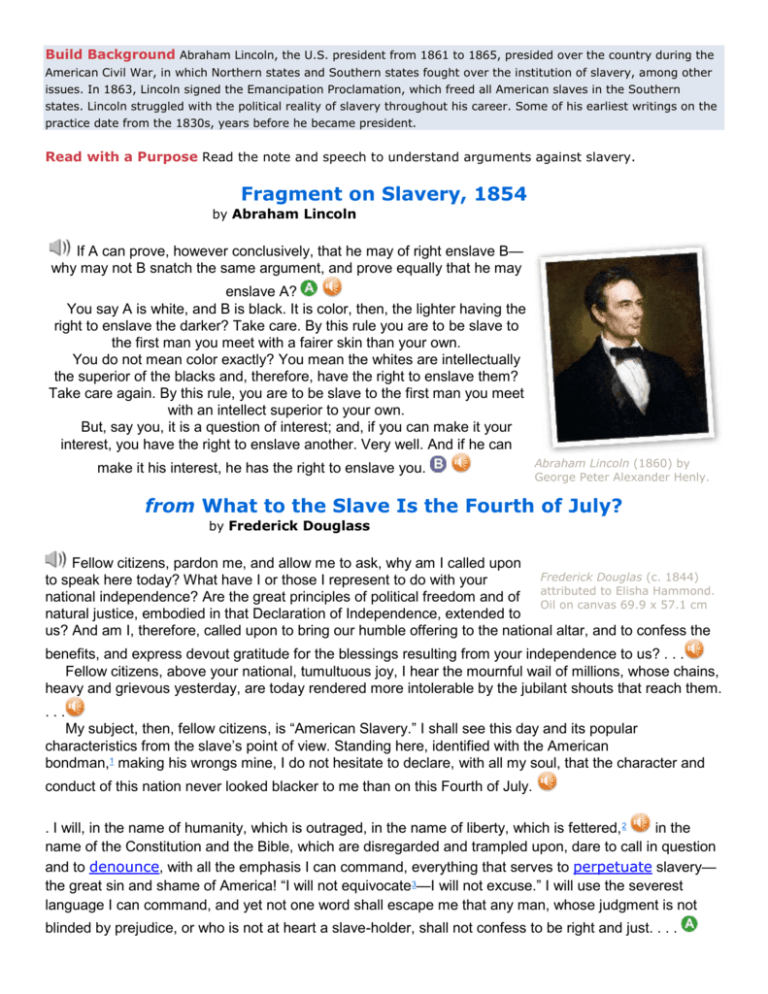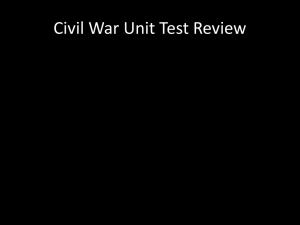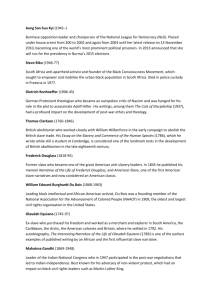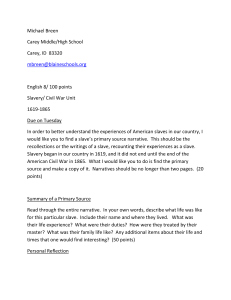Fragment on Slavery, 1854
advertisement

Build Background Abraham Lincoln, the U.S. president from 1861 to 1865, presided over the country during the American Civil War, in which Northern states and Southern states fought over the institution of slavery, among other issues. In 1863, Lincoln signed the Emancipation Proclamation, which freed all American slaves in the Southern states. Lincoln struggled with the political reality of slavery throughout his career. Some of his earliest writings on the practice date from the 1830s, years before he became president. Read with a Purpose Read the note and speech to understand arguments against slavery. Fragment on Slavery, 1854 by Abraham Lincoln If A can prove, however conclusively, that he may of right enslave B— why may not B snatch the same argument, and prove equally that he may enslave A? You say A is white, and B is black. It is color, then, the lighter having the right to enslave the darker? Take care. By this rule you are to be slave to the first man you meet with a fairer skin than your own. You do not mean color exactly? You mean the whites are intellectually the superior of the blacks and, therefore, have the right to enslave them? Take care again. By this rule, you are to be slave to the first man you meet with an intellect superior to your own. But, say you, it is a question of interest; and, if you can make it your interest, you have the right to enslave another. Very well. And if he can make it his interest, he has the right to enslave you. Abraham Lincoln (1860) by George Peter Alexander Henly. from What to the Slave Is the Fourth of July? by Frederick Douglass Fellow citizens, pardon me, and allow me to ask, why am I called upon Frederick Douglas (c. 1844) to speak here today? What have I or those I represent to do with your to Elisha Hammond. national independence? Are the great principles of political freedom and of attributed Oil on canvas 69.9 x 57.1 cm natural justice, embodied in that Declaration of Independence, extended to us? And am I, therefore, called upon to bring our humble offering to the national altar, and to confess the benefits, and express devout gratitude for the blessings resulting from your independence to us? . . . Fellow citizens, above your national, tumultuous joy, I hear the mournful wail of millions, whose chains, heavy and grievous yesterday, are today rendered more intolerable by the jubilant shouts that reach them. ... My subject, then, fellow citizens, is “American Slavery.” I shall see this day and its popular characteristics from the slave’s point of view. Standing here, identified with the American bondman,1 making his wrongs mine, I do not hesitate to declare, with all my soul, that the character and conduct of this nation never looked blacker to me than on this Fourth of July. . I will, in the name of humanity, which is outraged, in the name of liberty, which is fettered, 2 in the name of the Constitution and the Bible, which are disregarded and trampled upon, dare to call in question and to denounce, with all the emphasis I can command, everything that serves to perpetuate slavery— the great sin and shame of America! “I will not equivocate3—I will not excuse.” I will use the severest language I can command, and yet not one word shall escape me that any man, whose judgment is not blinded by prejudice, or who is not at heart a slave-holder, shall not confess to be right and just. . . . What point in the anti-slavery creed4 would you have me argue? On what branch of the subject do the people of this country need light? Must I undertake to prove that the slave is a man? That point is conceded already. Nobody doubts it. The slave-holders themselves acknowledge it in the enactment of laws for their government. They acknowledge it when they punish disobedience on the part of the slave. There are seventy-two crimes in the State of Virginia, which, if committed by a black man (no matter how ignorant he be), subject him to the punishment of death; while only two of these same crimes will subject a white man to like punishment. What is this but the acknowledgment that the slave is a moral, intellectual, and responsible being? The manhood of the slave is conceded. It is admitted in the fact that Southern statute books are covered with enactments, forbidding, under severe fines and penalties, the teaching of the slave to read and write. When you can point to any such laws in reference to the beasts of the field, then I may consent to argue the manhood of the slave. When the dogs in your streets, when the fowls of the air, when the cattle on your hills, when the fish of the sea, and the reptiles that crawl, shall be unable to distinguish the slave from a brute, then I will argue with you that the slave is a man! For the present it is enough to affirm the equal manhood of the Negro race. Is it not astonishing that, while we are plowing, planting, and reaping, using all kinds of mechanical tools, erecting houses, constructing bridges, building ships, working in metals of brass, iron, copper, silver, and gold; that while we are reading, writing, and ciphering, 5 acting as clerks, merchants, and secretaries, having among us lawyers, doctors, ministers, poets, authors, editors, orators, and teachers; that we are engaged in all the enterprises common to other men—digging gold in California, capturing the whale in the Pacific, feeding sheep and cattle on the hillside, living, moving, acting, thinking, planning, living in families as husbands, wives, and children, and above all, confessing and worshipping the Christian God, and looking hopefully for life and immortality beyond the grave—we are called upon to prove that we are men? Would you have me argue that man is entitled to liberty? That he is the rightful owner of his own body? You have already declared it. Must I argue the wrongfulness of slavery? Is that a question for republicans?6 Is it to be settled by the rules of logic and argumentation, as a matter beset with great difficulty, involving a doubtful application of the principle of justice, hard to understand? How should I look today in the presence of Americans, dividing and subdividing a discourse, to show that men have a natural right to freedom, speaking of it relatively and positively, negatively and affirmatively? To do so would be to make myself ridiculous, and to offer an insult to your understanding. There is not a man beneath the canopy of heaven who does not know that slavery is wrong for him. What! Am I to argue that it is wrong to make men brutes, to rob them of their liberty, to work them without wages, to keep them ignorant of their relations to their fellow men, to beat them with sticks, to flay their flesh with the lash, to load their limbs with irons, to hunt them with dogs, to sell them at auction, to sunder7 their families, to knock out their teeth, to burn their flesh, to starve them into obedience and submission to their masters? Must I argue that a system thus marked with blood and stained with pollution is wrong? No—I will not. I have better employment for my time and strength than such arguments would imply. . . . At a time like this, scorching irony, not convincing argument, is needed. Oh! had I the ability, and could I reach the nation’s ear, I would today pour out a fiery stream of biting ridicule, blasting reproach, withering sarcasm, and stern rebuke. For it is not light that is needed, but fire; it is not the gentle shower, but thunder. We need the storm, the whirlwind, and the earthquake. The feeling of the nation must be quickened; the conscience of the nation must be roused; the propriety8 of the nation must be startled; the hypocrisy of the nation must be exposed; and its crimes against God and man must be denounced. . . . Page 228 of Textbook Author’s View on Evidence from Text Type of Argument Slavery (With paragraph #) (Logic or Emotion) Fragment on Slavery- Lincoln What to the Slave is the Fourth of July- Douglass Each author has similar thoughts about slavery. Consider that one piece is written using logic while the other is using emotion. Write a (7-10 sentence) paragraph citing evidence from each text that supports the author’s purpose. ____________________________________________________________________________________________________ ____________________________________________________________________________________________________ ____________________________________________________________________________________________________ ____________________________________________________________________________________________________ ____________________________________________________________________________________________________ ____________________________________________________________________________________________________ ____________________________________________________________________________________________________ ____________________________________________________________________________________________________ ____________________________________________________________________________________________________ ____________________________________________________________________________________________________ ____________________________________________________________________________________________________ ____________________________________________________________________________________________________ ____________________________________________________________________________________________________ ____________________________________________________________________________________________________ ____________________________________________________________________________________________________ ____________________________________________________________________________________________________ ____________________________________________________________________________________________________ ____________________________________________________________________________________________________ ____________________________________________________________________________________________________ ____________________________________________________________________________________________________ _____________________________________________________________________________________________







